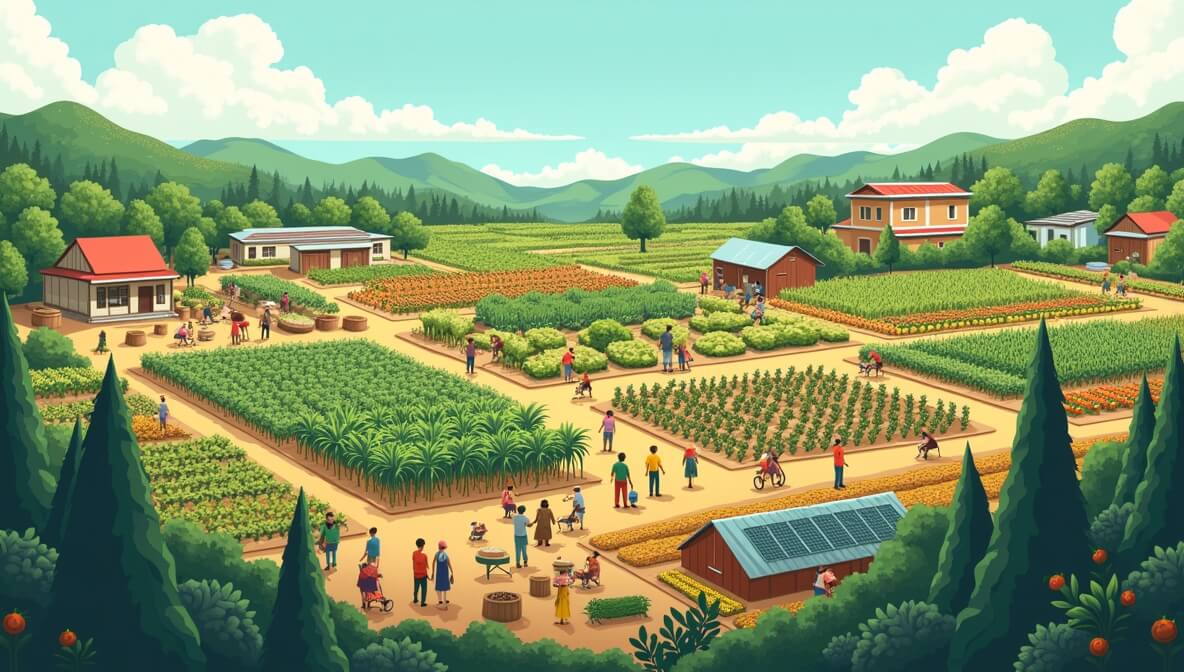Global Food Systems Challenges and Solutions

The way we grow, distribute, and consume food lies at the very heart of human survival — and yet, our current food systems are in crisis. Climate disruption, unsustainable farming, economic inequality, and staggering food waste all threaten the world’s ability to feed itself sustainably.
According to the UN Food and Agriculture Organization (FAO), nearly 828 million people around the world suffer from hunger — a number that has risen in recent years due to pandemic disruptions, conflict, and environmental decline. This isn't just a humanitarian issue; it's a call for bold, systemic transformation in how we think about food.
The Challenges Facing Global Food Systems
Climate Change and Environmental Stress
- Modern agriculture both suffers from and contributes to the climate crisis. Rising temperatures, unpredictable rainfall, and extreme weather events have already begun to reduce crop yields, especially in vulnerable regions like sub-Saharan Africa and South Asia.
- At the same time, industrial farming practices are major contributors to greenhouse gas emissions, deforestation, soil erosion, and water pollution. The system designed to feed us is, paradoxically, undermining the environmental conditions it depends on.
- Read how climate change impacts food production
Inequality in Access to Food
- Food insecurity is not caused by scarcity. The world produces enough food to feed everyone — but inequitable distribution means that while some populations face hunger and malnutrition, others face rising rates of obesity due to overconsumption and poor-quality diets.
- Meanwhile, rural farmers in many low-income countries often produce food without being food-secure themselves, due to exploitative market prices, poor infrastructure, and lack of land rights. A just food system must address these underlying power imbalances.
Global Food Waste
- Roughly one-third of all food produced globally is lost or wasted — about 1.3 billion tons annually. This happens across the entire supply chain:
- Crops rot before harvest due to lack of labor or storage.
- Food spoils during transport due to poor logistics.
- Retailers reject "imperfect" produce.
- Households throw away edible food.
- Reducing waste could feed billions, cut emissions, and reduce pressure on forests, water, and farmland.
- Learn how communities are addressing food waste
Overreliance on Industrial Agriculture
- Modern food systems have become highly centralized and industrialized, prioritizing maximum yield and profit over biodiversity, worker welfare, and ecological balance. Monoculture farming strips land of nutrients and leaves it vulnerable to pests and climate shocks.
- By contrast, smallholder farmers — who produce nearly one-third of the world’s food — often use sustainable, low-input techniques but are left without proper support, infrastructure, or access to markets.
Building Resilient and Equitable Food Systems
Promoting Sustainable Agriculture
- Sustainable farming practices like agroecology, regenerative agriculture, and organic farming aim to work with nature, not against it. They:
- Rebuild soil fertility
- Promote crop diversity
- Reduce reliance on chemical fertilizers and pesticides
- Improve resilience to climate shocks
- Supporting these methods with training, financing, and policy reform is essential to shifting away from extractive models of food production.
Strengthening Local and Regional Food Systems
- Local food systems offer a promising alternative to long, fragile global supply chains. Investing in farmers' markets, urban agriculture, co-ops, and community-supported agriculture (CSA) programs:
- Keeps food dollars in local economies
- Reduces emissions from transport
- Increases access to fresh, culturally appropriate food
- See how urban farming feeds growing cities
Reducing Food Waste at All Levels
- Solutions to food waste must operate at multiple levels:
- Post-harvest storage improvements can save crops.
- Food rescue programs can redirect surplus to people in need.
- Public awareness campaigns can teach people to shop and store food wisely.
- Composting programs can turn food scraps into soil nutrients.
- Households play a critical role — simple steps like planning meals, freezing leftovers, and composting make a tangible difference.
Investing in Innovation and Technology
- Technological innovation is reshaping how food is produced, moved, and tracked:
- Precision agriculture uses sensors and AI to optimize water and nutrient use.
- Drought-resistant crops are helping regions adapt to changing climates.
- Blockchain ensures transparency in food sourcing and trade.
- However, it’s essential that these tools remain accessible and equitable — especially for smallholder farmers and marginalized communities.
- Explore how innovation helps fight hunger
Global Policy and Cross-Sector Collaboration
- Transforming food systems at scale requires strong public policy, international cooperation, and multi-stakeholder action. This includes:
- Shifting subsidies away from environmentally damaging practices
- Strengthening land rights for indigenous and rural communities
- Investing in food system infrastructure (roads, storage, irrigation)
- Creating social safety nets to protect against price shocks
- The UN's Sustainable Development Goal 2 — Zero Hunger can only be achieved with collective commitment from governments, nonprofits, corporations, and citizens alike.
Conclusion: Food Systems at a Crossroads
We are at a pivotal moment. Without urgent reform, global food systems will continue to fail people and the planet—fueling hunger, inequality, and ecological collapse.
But if we choose differently—by:
- Supporting sustainable farming
- Empowering local food economies
- Halving food waste
- Prioritizing inclusive innovation
- Enacting bold policy reforms
—then we can build a future where healthy, affordable, and sustainable food is a right, not a privilege.
